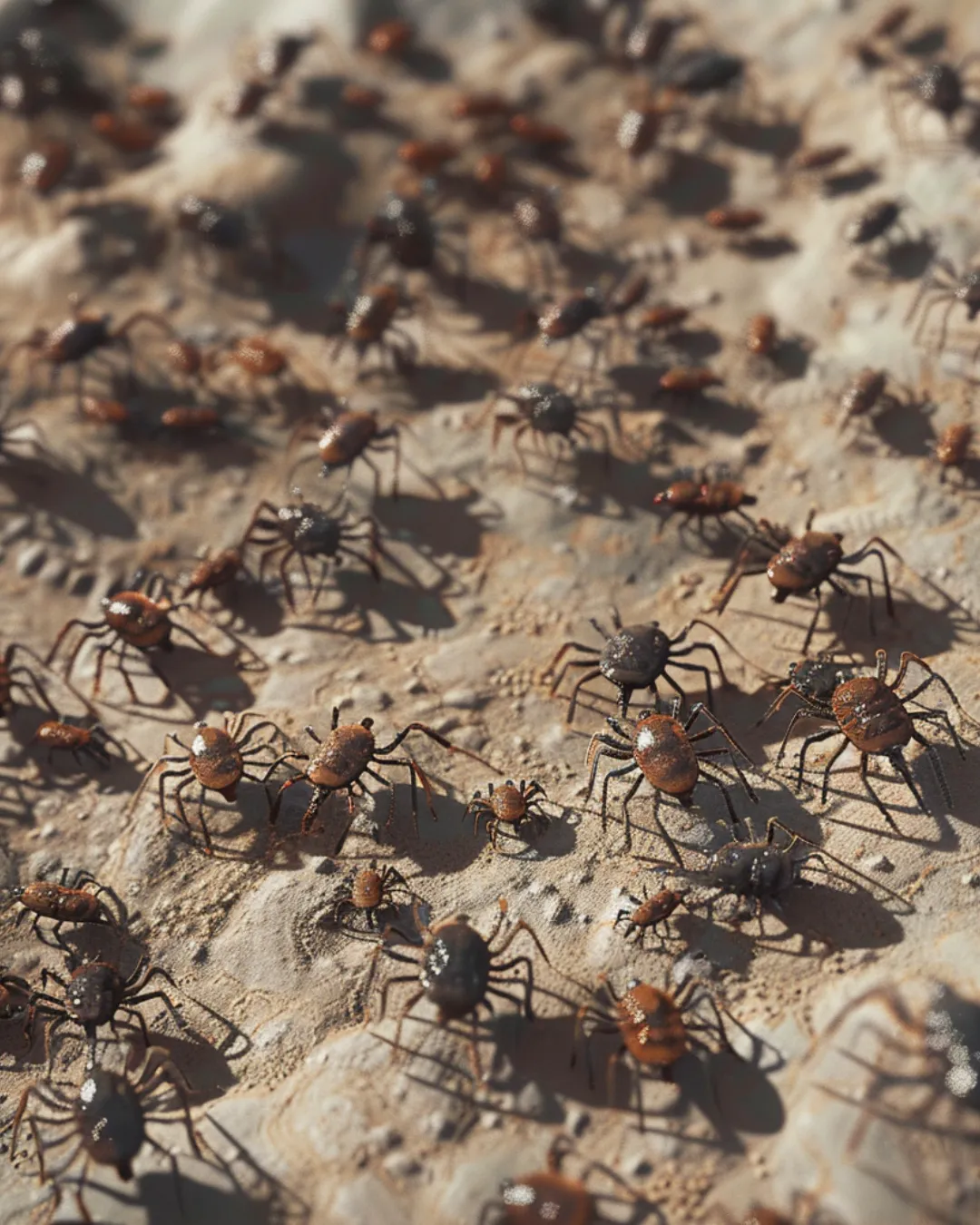The Shield Pest Journal
Check out Shield Pest Appalachia’s most recent blog posts for helpful pest prevention and control suggestions. Our blog covers from detecting common pests to creating tailored solutions in the Tennessee and Virginia areas. Do you have a pest-related question? Contact us today for experienced guidance and solutions targeted to your specific needs.

Summer Nights, Pest-Free Delights: Mosquito and Tick Prevention
Summer Nights, Pest-Free Delights: Mosquito and Tick Prevention
Navigating the Hazards: Understanding the Risks Behind Mosquitoes and Ticks
Mosquitoes: Tiny Vectors of Major Diseases
West Nile Virus (WNV): Most cases are mild, but severe cases can lead to neurological effects and even death.
Zika Virus: Known to cause birth defects when pregnant women are infected. While symptoms are generally mild for others, the potential for severe outcomes, especially for unborn children, is significant.
Dengue Fever: Causes severe flu-like symptoms and, in some cases, can lead to severe dengue, which is potentially lethal.
Chikungunya Virus: Characterized by joint pain, fever, headache, and muscle pain. While not typically fatal, the symptoms can be severe and disabling.
Malaria: Although more common in tropical regions, malaria’s impact is profound, with severe cases potentially leading to death.
Ticks: Carriers of Tick-Borne Diseases
Lyme Disease: The most common tick-borne illness in the United States, known for its bullseye rash, fever, fatigue, and joint pain. If left untreated, it can spread to joints, the heart, and the nervous system.
Rocky Mountain Spotted Fever (RMSF): Characterized by fever, headache, abdominal pain, vomiting, and muscle pain. It can be fatal if not treated early with the right antibiotic.
Anaplasmosis: Symptoms include fever, headache, chills, and muscle aches. Although treatable, it requires prompt medical attention.
Babesiosis: Affects the red blood cells, can be asymptomatic, but severe cases can lead to hemolytic anemia, jaundice, and kidney failure.
Ehrlichiosis: Symptoms can include fever, headache, fatigue, and muscle aches. Like other tick-borne diseases, early treatment is critical.
Proactive Steps: Preventative Strategies for Mosquito and Tick Control in and Around Your Home
For Mosquito Control
Eliminate Standing Water: Regularly check and remove any standing water in your yard, as this is a prime breeding ground for mosquitoes. Empty containers, bird baths, and clogged gutters weekly.
Use Mosquito Dunks: For standing water that cannot be eliminated, such as ponds, use mosquito dunks. These contain a bacterium that kills mosquito larvae but is safe for pets, birds, and wildlife.
Maintain Yard and Garden: Keep your lawn mowed and trim bushes and shrubs. Tall grass and dense vegetation provide shelter for adult mosquitoes.
Install Screens: Ensure window and door screens are intact to prevent mosquitoes from entering your home.
Use Fans: Outdoor fans can help deter mosquitoes, as they are weak flyers and struggle against the air movement.
Plant Natural Repellents: Incorporate plants that naturally repel mosquitoes, such as citronella, lavender, marigolds, and basil, into your garden or patio area.
For Tick Control
Create a Tick-Safe Zone: Implement landscaping techniques to create a buffer zone between wooded areas and your lawn, playgrounds, or patios. Use wood chips or gravel as a barrier where your yard meets the woods.
Treat High-Risk Areas: Consider treating the perimeter of your yard and high-risk areas like stone walls or wood piles with a professional-grade tick control product. Always follow label directions or hire a professional pest control service.
Keep Leaf Litter at Bay: Regularly remove fallen leaves and clear tall grasses and brush around homes and at the edge of lawns.
Choose Deer-Resistant Plants: Since deer can carry ticks into your yard, planting deer-resistant vegetation can help reduce your tick exposure.
Check for Ticks: After spending time outdoors, especially in areas known for ticks, perform thorough tick checks on yourself, your children, and pets.
Frequently Asked Questions: Insights into Mosquito and Tick Prevention
Q1: Can certain weather conditions affect mosquito and tick populations?
A1: Yes, weather conditions play a significant role in the breeding and activity levels of mosquitoes and ticks. Mosquito populations tend to increase in warm, humid weather, especially after rainfall, which can create ideal breeding sites. Ticks thrive in warm, moist environments but require a certain level of humidity to stay active. Mild winters and early springs can lead to increased tick activity earlier in the year.
Q2: Are there any natural predators I can introduce to my yard to help control mosquito and tick populations?
A2: Natural predators can play a role in controlling pest populations. For mosquitoes, introducing fish species that feed on mosquito larvae into garden ponds can help. Birds, bats, and certain insects like dragonflies also feed on adult mosquitoes. For ticks, chickens and guinea fowl are known to eat ticks, although their effectiveness in significantly reducing tick populations in a large area is debated among experts.
Q3: How does landscaping affect my risk of mosquito and tick exposure?
A3: Landscaping and yard maintenance can greatly influence your risk of exposure to these pests. Mosquitoes breed in standing water, so eliminating water-holding containers and ensuring proper drainage can reduce breeding sites. For ticks, creating a buffer zone between wooded areas and your lawn, such as using wood chips or gravel, and keeping grass short can decrease your risk of tick encounters.
Q4: Can certain types of mulch repel mosquitoes or ticks?
A4: While no mulch can completely repel mosquitoes or ticks, cedar mulch is believed to have some repellent properties against these pests. Cedar oil, found in cedar wood, can deter some insects, including mosquitoes. However, relying solely on cedar mulch for pest control is not recommended as a standalone solution.
Q5: How effective are mosquito traps, and should I consider installing them?
A5: Mosquito traps can be an effective part of a comprehensive mosquito control strategy. These devices attract mosquitoes by mimicking human breath or body heat and then trap them. However, their effectiveness can vary based on the type of trap, placement, and the size of the mosquito population. They are best used in conjunction with other prevention methods.
Q6: Is it safe to use DEET-based repellents, or should I opt for natural alternatives?
A6: DEET is considered safe for most people when used according to the product instructions, including pregnant women and children over two months old. However, for those seeking natural alternatives, products containing oil of lemon eucalyptus or picaridin have also been proven effective. It's essential to choose a repellent that is EPA-registered for the best protection.
Q7: How often should I conduct tick checks after being outdoors?
A7: It's advisable to conduct tick checks immediately after spending time in areas known for ticks, such as wooded or grassy locations. Remember to check your clothing, body, children, and pets, as ticks can attach to any part of the body and are often found in hard-to-see areas.
Shield's Advanced Mosquito and Tick Treatment Solutions
Customized Treatment Plans
Our treatment process begins with a comprehensive evaluation of your property to identify breeding sites, high-risk areas, and conditions conducive to mosquito and tick populations. Based on this assessment, we develop a customized treatment plan that targets the pests at every stage of their life cycle.
Eco-Friendly Application Methods
We utilize the latest in eco-friendly pest control technology, employing methods and products that are safe for people, pets, and the planet:
Mosquito Control: Our mosquito treatment includes the application of fast-acting, long-lasting insecticides to foliage and breeding sites, as well as the use of larvicides to prevent new generations from developing.
Tick Management: We focus on targeted treatments to landscaping, wooded boundary areas, and known tick habitats on your property, using products specifically designed to reduce tick populations without harming the surrounding environment.
Integrated Pest Management (IPM)
Adopting an Integrated Pest Management (IPM) approach, we combine physical, biological, and chemical control methods. This might include habitat modification to make your property less attractive to pests, the introduction of natural predators, and the strategic use of chemical controls where necessary.
Preventative Measures and Follow-Up
Prevention is a key component of our strategy. We offer advice and solutions to help you minimize the risk of future infestations, such as recommendations for yard maintenance, proper drainage, and the use of personal protective measures. Regular follow-up treatments and inspections ensure long-term control and protection.
For more information or to get started, visit Shield Pest Appalachia. Let’s take the first step towards a pest-free summer.
Office:
1300 University Pkwy, Johnson City, TN 37604, United States
Call
423-379-2775
Copyright 2024. All Right Reserved.

